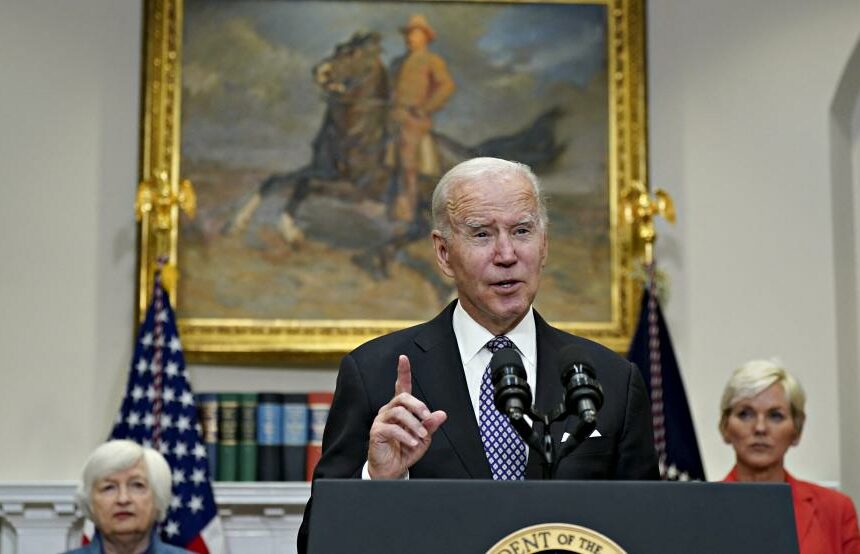High gas prices have been a thorn in the side of Biden, and the administration has scrambled to find a way to relieve Americans’ pain at the pump. This past summer Biden made a controversial trek to Saudi Arabia to court Mohammed Bin Salman and convince him to increase oil production. Those efforts were undercut when the Saudi-led OPEC announced a reduction in oil production.
In what seems like a desperate move, the Biden Administration doubled down on the talking point that oil companies are price-gouging and need a punitive tax policy to reel in their behavior.
“Record profits today are not because they’re doing something new or innovative. The profits are a windfall of war,” Biden said in a speech at the White House earlier this month.
>>>READ: No, Corporate Greed Is Not to Blame for High Gas Prices
The fossil fuel industry’s surplus profits are a result of economics, not corporate greed. As global energy shortages have continued and demand has increased, the price of oil and natural gas has naturally gone up. And while consumers are understandably frustrated with high heating bills and prices at the pump, blaming oil and gas companies is misguided.
The push to punish private industry during a global energy crisis will ultimately backfire and increase costs for consumers. Blaming these companies negates the fact that high profits are being driven by global energy shortages.
Oil goes through boom and bust cycles. Although they may reap surplus profits due to events out of their control, such as the war in Ukraine, there are extended periods in which oil extraction is not profitable. In 2020, during the height of the pandemic, oil companies operated at an economic loss. If these companies find their profits being raided during good times but receive no additional assistance during bad times, then their business becomes untenable.
Refineries in the US reduced capacity during the 2020 pandemic, and have not fully recovered since. The US has five fewer refineries than at the beginning of 2020. Due to the sharp decrease in oil demand during the pandemic, several refineries shuttered for good.
Second, companies made the necessary investments to make profits from unusual market conditions. If the government arbitrarily decides to cut into a company’s profits, what incentive does a company have to invest and take risks? Big oil companies such as Shell have invested a significant portion of their capital into renewable energy. This year, BP agreed to pay $4.1 billion for a company that replaces fossil fuel gas with natural biogas found in landfills. In 2022, big oil companies invested more capital in renewables than oil and gas for the first time ever. Schemes such as a windfall tax threaten to undo the incredible progress made on this front.
We recently had a similar debate surrounding whether pharmaceutical companies should be allowed billions in profit from the COVID vaccines. If there were no hypothetical reward, what incentive would Pfizer, Moderna, or Johnson & Johnson have to seek the innovations which saved millions of lives?
>>>READ: Innovation is Unleashing a Climate Tech Renaissance
The Biden administration is not the first government that has considered a one-time windfall tax against oil and gas companies. On March 8th, the European Commission recommended a tax on the profits of oil and gas companies. In May, the UK introduced a 25% tax on the profits of energy producers. In September, the European Union (EU) unveiled a plan to raise $140 billion by taxing the surplus profits of energy companies. These strategies have not worked, as European gas prices remain very high. These moves have been met with praise by United Nations (UN) Secretary-General Antonio Guterres, as he encouraged all developed nations to enact similar taxes.
Whether it’s in the United States or abroad, windfall profits taxes will punish consumers, not companies, and curtail investment in innovation and new supplies. While there is little that the Biden administration can do to immediately lower prices, there are several alternatives to a windfall tax that would provide energy relief. Repealing the Jones Act, a century-old law that requires goods being shipped between two U.S. ports to be done on an American vessel manned by a majority American crew, would go a long way in reducing costs for consumers. Because of Jones Act restrictions, it costs three times more to ship oil from Texas to the East Coast than it does to ship it from Canada.
Furthermore, the Biden administration can encourage future private sector investment by providing regulatory certainty to the oil and gas industry. Taxing excess profits, however, is misguided and will fail to lower costs for consumers or address domestic energy security concerns.
Corey Walker is a budding historian and economist. He loves drinking hot chocolate, wearing sweaters, and watching football in the fall.
The views and opinions expressed are those of the author’s and do not necessarily reflect the official policy or position of C3.
